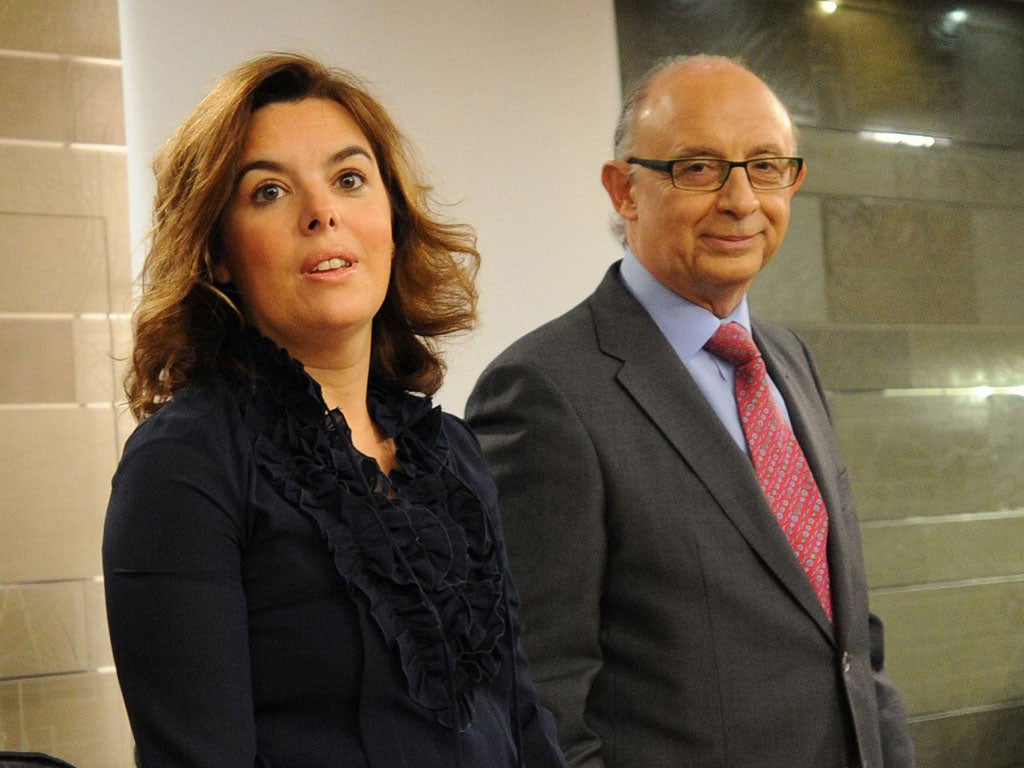Spain reaching breaking point with another round of crisis cuts
Budget savings worth €40bn to satisfy European partners will fuel growing regional demands for independence

Spain's government yesterday unveiled a new round of spending cuts and tough austerity measures in its 2013 budget, which is expected to pre-empt the conditions its European partners could lay down if the indebted nation becomes the latest eurozone member to request a bailout.
The small print for the 2013 budget will not be revealed until tomorrow, but media estimates said that yesterday's savings and tax hikes would be worth around €40bn, most of it disappearing into debt servicing. Ministries will be asked to cut their budgets by an average of 8.9 per cent. A further €4.3bn will be squeezed out of Spain's beleaguered taxpayers.
"This is a crisis budget aimed at emerging from the crisis... In this budget there is a larger adjustment of spending than revenue," said Deputy Prime Minister Soraya Saenz.
The budget comes barely six months after the government announced the biggest series of austerity cutbacks in the country's modern history for its 2012 budget, axing €27bn. France is also expected to announce a budget today of spending cuts and new taxes.
For Spain's Prime Minister, Mariano Rajoy, this latest round of cuts and tax hikes are considered a necessary evil if he is to convince his European colleagues that he can meet deficit targets and ease the pressure on empty coffers. The measures are designed to ramp up credibility in the eurozone to its highest level possible, prior to an widely anticipated bailout for Spanish banks.
Mr Rajoy and his ruling Partido Popular are scrambling to keep in line with the EU budget deficit of 6.3 per cent of GDP this year and 4.5 per cent of GDP in 2013. Discouragingly, by June Spain's deficit for 2012 had already reached around 4 per cent of GDP. But that is far from his only headache.
In Catalunya, the pro-independence movement is fast gaining momentum, with the regional nationalist government announcing local elections for November and touting the idea of a referendum on sovereignty. Local elections in the Basque Country and Galicia on 20 October could see further gains for nationalists in two areas with longstanding separatist traditions.
These renewed breakaway impulses are linked to the Spanish economy facing its most unrelenting recession since the 1950s. Unemployment is set to drop three-tenths of a per cent in 2013, to 24.3 per cent. There have been protests over the deteriorating quality of life. Thousands of demonstrators this week tried to ring the Houses of Parliament. Dozens of police and demonstrators were injured in clashes.
If the depth of government cuts announced yesterday was grievous enough for Spain's deteriorating economy, then today's news may be even worse when a stress test showing the exact size of Spain's toxic housing debts in its banking system is made public.
Eurozone discontent is also likely to spread to France, where an increasingly unpopular President François Hollande unveils €30bn of increased taxes and spending cuts in an attempt to honour France's deficit-cutting commitments for next year.
Against the background of the resurgent crisis in the eurozone, the Finance Minister, Pierre Moscovici, faces the thankless task of satisfying both the markets and fractious French public opinion that his 2013 budget can deliver Mr Hollande's campaign promise of "growth with discipline".
With the French jobless total already passing three million this week and further, large-scale industrial redundancies threatening, France faces economic stagnation or recession next year.
The broad lines of the new budget have already been revealed. France will, in theory, meet the eurozone target of a 3 per cent of GDP budget deficit next year by raising €20bn in new taxes and cutting €10bn from state spending. The share of GDP "spent" by the state will remain unchanged at 56 per cent.
Faced with a possible revolt on the Left, Mr Moscovici insists that this is not an "austerity" budget. When addressing the international markets, he says that it is the biggest deficit correction attempted by any French government in three decades.
Join our commenting forum
Join thought-provoking conversations, follow other Independent readers and see their replies
Comments
Bookmark popover
Removed from bookmarks